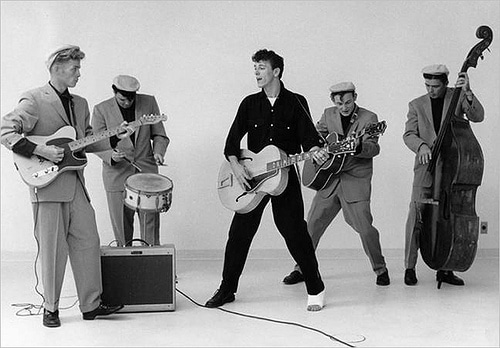When a music critic wants to indicate that a song lacks lyrical sophistication, he or she will often refer to its lyrics as being of the “moon in June” sort.
It’s a label left over from the Tin Pan Alley era, when even great composers like Irving Berlin churned out a hundred uninspired Moon/June tunes for every highly original classic like “Blues Skies” or “Puttin’ On The Ritz.” If rock and roll has an equivalent in the area of clichéd lyrics, it is probably “Baby” and “Maybe”—a rhyming pair made most famous in the smoldering early-rock classic “Be-Bop-A-Lula,” which was recorded in Nashville, Tennessee, by the rockabilly legend Gene Vincent on this day in 1956.
The story of how the decidedly un-complex lyrics of “Be-Bop-A-Lula” got written is shrouded in a certain amount of controversy.
Officially, Gene Vincent’s business manager, Bill “Sheriff Tex” Davis, is credited as the co-writer, but Sheriff Tex, a savvy 40-year-old from Connecticut, seems an unlikely source of such naïve gem.
The story that has the greater ring of truth credits a young man named Donald Graves—a buddy Gene Vincent made in a Portsmouth, Virginia, Veteran’s Hospital. Vincent—born Vincent Eugene Craddock in 1935—had just reenlisted in the U.S. Navy in the spring of 1955 when he suffered a devastating leg injury in a motorcycle accident. That injury would land him in hospital for more than a year, where a fellow patient remembers Vincent and Graves tooling around the facility working out the song that would eventually become a classic.
By the time Gene Vincent’s demo tape reached Capitol Records the following spring, however, Graves had been bought out of his share in “Be-Bop-A-Lula” by Sheriff Tex, reportedly for just $25.
It wasn’t the obvious brilliance of “Be-Bop-A-Lula,” but rather the uncanny resemblance between Gene Vincent’s voice and Elvis Presley’s that explains the speed with which Capitol snapped Vincent up and got him into the studio.
In fact, when Vincent and his Blue Caps recorded “Be-Bop-A-Lula” on May 4, 1956, it was as a “B” side to a now largely forgotten tune called “Woman Love.”
As soon as disc jockeys began “flipping” Vincent’s debut single, however, “Be-Bop-A-Lula” became a smash, rising to number 7 on the pop charts and selling more than 2 million copies in its first year of release.


